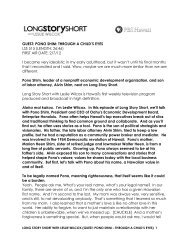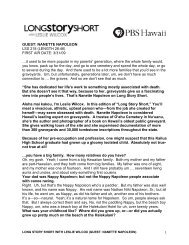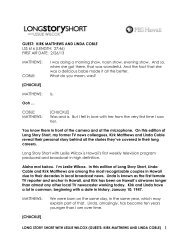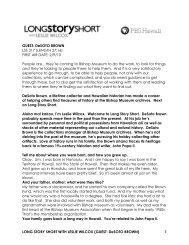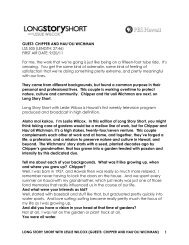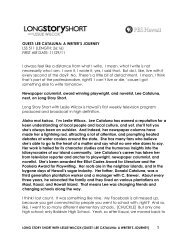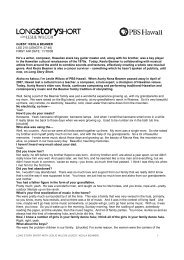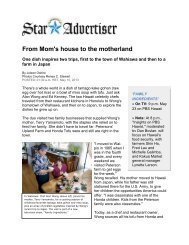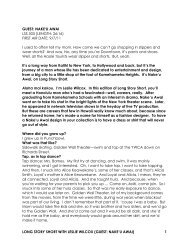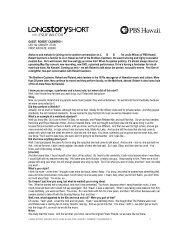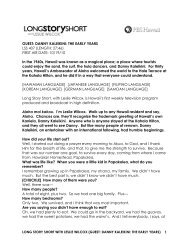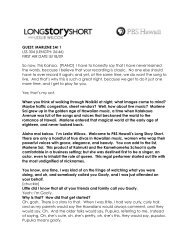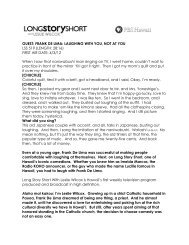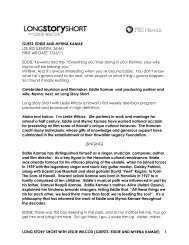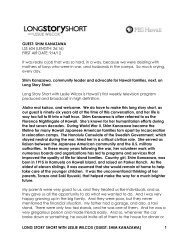guest: puakea nogelmeier on the hawaiian language - PBS Hawaii
guest: puakea nogelmeier on the hawaiian language - PBS Hawaii
guest: puakea nogelmeier on the hawaiian language - PBS Hawaii
You also want an ePaper? Increase the reach of your titles
YUMPU automatically turns print PDFs into web optimized ePapers that Google loves.
you know, what makes a kanikau a kanikau, and how this is phrased this way,<br />
and …<br />
What are some of <strong>the</strong> subtleties he told you early <strong>on</strong>?<br />
Well, sometimes it’s like <strong>the</strong> choice of a pattern. You use a pattern, a he<br />
pattern, an o pattern, an aia pattern, an ua pattern, and why that emphasis<br />
here pulls something into focus. So now, watch how that focus is flavoring what<br />
follows it. So understanding line three, because of what was happening in line<br />
<strong>on</strong>e. And <strong>the</strong>re’s things today that I’ll think, That’s what he said about—I mean,<br />
that’s why he pointed—<br />
And was he rare gem, or were <strong>the</strong>re a number of people who understood<br />
<strong>Hawaii</strong>an <strong>language</strong> and subtleties that way?<br />
He was an odd duck. There were still people in <strong>the</strong> late 70s and 80s. That’s<br />
when <strong>the</strong>y started to predict <strong>language</strong> death.<br />
M-hm.<br />
The median age of <strong>language</strong> speakers were in <strong>the</strong>ir seventies. There were very<br />
few children outside of <strong>the</strong> Niihau community. So <strong>the</strong>y said ten, fifteen years,<br />
<strong>the</strong>re will be no speakers left.<br />
And <strong>the</strong>re were so many people who took it as, well, yes, it is <strong>on</strong> <strong>the</strong> brink of<br />
extincti<strong>on</strong>.<br />
Yeah.<br />
It’s almost like—<br />
Why; yeah.<br />
Exactly.<br />
Yeah; it’s like, oh, that’s too bad.<br />
What can we do, well <strong>the</strong>re’s no current use for it.<br />
Yeah. The <strong>language</strong> revitalizati<strong>on</strong> that kicked up from <strong>the</strong> 70s has just—it’s never<br />
lost its stride. It’s never lost its momentum, it’s still extending and growing. That<br />
has kept me entertained for three decades. Ever since I launched into<br />
<strong>language</strong>, <strong>the</strong>re’s been a dynamic force moving forward. Might estimate ten<br />
thousand people today, who can work with <strong>Hawaii</strong>an <strong>language</strong>, who have<br />
different levels of fluency where <strong>the</strong>y can utilize <strong>Hawaii</strong>an <strong>language</strong> ei<strong>the</strong>r as a<br />
c<strong>on</strong>versati<strong>on</strong>al tool or as a writing, or reading, or listening tool. It’s a usable level<br />
of it. And probably twice that, that have at least an insight into it. They can say<br />
<strong>the</strong> right things in <strong>the</strong> morning, and <strong>the</strong>y can ask for where’s <strong>the</strong> lua or<br />
something, you know. They—<br />
I’ve been in elevators, I’ve been at football games where people are talking<br />
<strong>Hawaii</strong>an. And what gets me is <strong>the</strong>y have modern day—<strong>the</strong>y’re describing<br />
modern day phenomena, and <strong>the</strong>y have—<br />
Uh-huh.<br />
—<strong>the</strong> words for it.<br />
Yeah, yeah. The Chevy has a flat tire, and you know, da-da-da. Or—<br />
The refrigerator is busted.<br />
Yeah, <strong>the</strong> iPod isn’t working today [INDISTINCT].<br />
LONG STORY SHORT WITH LESLIE WILCOX<br />
(GUEST: PUAKEA NOGELMEIER ON THE HAWAIIAN LANGUAGE)<br />
2



